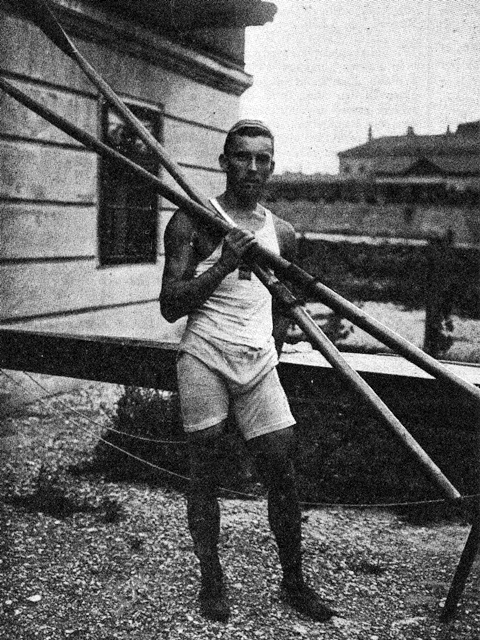
| Roles | Competed in Olympic Games |
|---|---|
| Sex | Male |
| Full name | Miltiades•Manno |
| Used name | Miltiades•Manno |
| Nick/petnames | Milti |
| Born | 19 February 1879 in Pančevo, Južna Bačka (SRB) |
| Died | 16 February 1935 (aged 55 years 11 months 25 days) in Budapest, Budapest (HUN) |
| Measurements | 76 kg |
| Affiliations | Hungária EE, Budapest (HUN) |
| NOC |  Hungary Hungary |
| Medals | OG |
| Gold | 0 |
| Silver | 1 |
| Bronze | 0 |
| Total | 1 |
Miltiades Manno was a 1912 Olympian in rowing, becoming one of the few athletes who also took part in the art competitions. He came from a family of Greek immigrants and was successful in many sports, including swimming, cycling, football, rowing, and speed skating. In football, he was the top scorer of the Budapesti TC, who won the first two Hungarian Championships in 1901 and 1902, and Manno twice played in friendlies with the national team. In speed skating, Manno placed in the top three at the 1903 and 1905 European Championships and the 1903 World Championships. In rowing, he won a total of 11 national championships and also achieved international success, particularly in the singles.
After graduating from the Academy of Fine Arts in München in 1907, Manno became a graphic artist, painter and sculptor, but he was also known as a caricaturist and portrait painter. In World War I, he was wounded several times while fighting in Galicia and subsequently had to retire from sports. As a civilian, he returned to the Galician theatre and depicted the battlefield in numerous pictures, which he later used to create sculptures showing horse attacks, some of which are still offered at auctions. Sport continued to be one of his favorite topics as an artist. His sculptures are still sold at auctions today. After the end of the short-lived Hungarian Republic of Councils in 1920, Manno supported the autocratic Hungarian Regent Miklós Horthy. Until his death in 1935, Manno also supported the spread of European anti-Semitism. Because of this, after World War II, a veil of silence was drawn over his life.
Manno competed in Los Angeles with a total of 27 works in the categories of drawings and watercolors (10), graphic art (7) and sculpture (10), and won the silver medal in Sculpturing with his work Wrestling. The original of this sculpture is now on display in the Sports Museum in Budapest. This bronze version is 80 x 80 x 70 cm in size. His models were the well-known Hungarian wrestlers Béla Varga and László Papp. The sculpture, initially made in ceramics, was cast in bronze for the 1932 art competition. The Start of the sprinter (also titled Short distance runner at the start) was a bronze figure in the format 43 x 25 cm. The bronze medal For the anniversary of the Hungarian Football Association was designed on the occasion of the 25th anniversary of the Hungarian Football Association in 1926 with a diameter of 8 cm. The Military Sports Medal was awarded in the 1930s on various occasions, which were engraved on the back respectively. The identification of the University Sports Medal from 1930 is less clear. One type was created for the Péter Pázmány University (now Loránd Eötvös University) in Budapest with a diameter of 38 mm. In 1928 Manno designed the Turul bird emblem for the football department of the Ferencvaros TC, which had just started professional operation. The motif of the Turul, a mythical creature that is today used mainly by the right-wing groups, may also have been produced as a medal.
What survived of his paintings and graphic works are mainly the posters, such as one for the opening of a sports exhibition at the National Museum in 1926 and another one for a soccer match between the city teams of Budapest and Berlin in 1923. Whether these were among the submitted works is unknown.